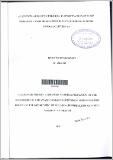An Investigation into the Effects of Motivation on Staff Turnover: A Case of Teachers in Private Schools in Busia Municipality, Kenya

View/
Date
2013Author
Elingit, Romano Okwi
Type
ThesisLanguage
enMetadata
Show full item recordAbstract
The purpose of this project was to investigate the effects of motivation on staff turnover a case of teachers of private schools in Busia municipality. The statement of the problem, since motivation leads to attainment of goals, teachers needed to be effectively motivated by the management so that they work towards the achievement of institution's objectives of offering quality education to produce good results to enable the learners move from primary to secondary. This aimed at sustaining the school as a business organization whose major was to make profit. The general objective was to look at the effects of motivation on staff turnover.We looked at four main specific objectives; effects of monetary incentives on teacher motivation which was the main source of basic needs; effects of non-monetary on motivation highlighting how non-monetary rewards like participative decision making, autonomy to the job, organizational practices, and recognition can motivate a teacher to work hard towards achievement of organizational objectives; the effect of interpersonal relationships on motivation of teachers on teachers motivation. The respondents are teachers of private schools in Busia municipality. The teacher's employees. The variables involved were motivation as independent variable and turnover dependent variable The knowledge gap was to find the motivators favorable for individual teachers to curb rampant turnover especially in third term when national exams are due. The research design used was the descriptive design as it gave room for both quantitative and qualitative data to be collected. The target population was all the fifteen schools from which 150 teachers were covered making in total of 150 respondents in the municipality. Census was used for 150 teachers piloting of instruments was done in which content validity was used with a ratio of 1 and of 0.886 which was ideal to give valid information. The data collection tools were the questionnaires that were distributed to all the 150 teachers who were purposively sampled from all the private schools within Busia municipality. The the questionnaires were analyzed using SPSS and presented in tables and graphs of which the summary, conclusions and recommendations for further research were made. It was found out that incentives both monetary and none monetary alongside interpersonal relationships was likely to affect teacher motivation and possibly lead to them quitting the organization to look for better places. It was therefore recommended that directors should provide both incentives, improve interpersonal relationship. It was further suggested that a study to be carried on the impact of incentives in technical institutions in Busia County and on challenges facing private institutions in motivation of staff in Busia County.
Publisher
ANU
